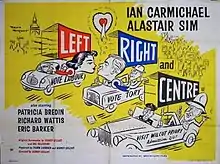| Left Right and Centre | |
|---|---|
 | |
| Directed by | Sidney Gilliat |
| Written by | Val Valentine Sidney Gilliat |
| Produced by | Frank Launder Sidney Gilliat Leslie Gilliat |
| Starring | Ian Carmichael Alistair Sim Patricia Bredin Richard Wattis Eric Barker |
| Cinematography | Gerald Gibbs |
| Edited by | Gerry Hambling |
| Music by | Humphrey Searle |
| Distributed by | British Lion Film Corporation |
Release date |
|
Running time | 95 minutes |
| Country | United Kingdom |
| Language | English |
Left Right and Centre is a 1959 British satirical comedy film directed by Sidney Gilliat and starring Ian Carmichael, Patricia Bredin, Richard Wattis, Eric Barker and Alastair Sim. It was produced by Frank Launder.[1][2] A political comedy, it follows the events of a by-election in a small English town.
Plot
Robert Wilcot, a popular television personality, is selected as the Conservative candidate for the provincial town of Earndale in the upcoming by-election. His selection is mostly due to the influence of his uncle, Lord Wilcot, a powerful local figure. His opponent is to be Stella Stoker, a fishmonger's daughter with a degree from the London School of Economics who has been chosen to stand for the Labour Party.
Travelling up on the train to Earndale, the two candidates meet and while she quickly works out who he is, he remains ignorant of her true identity. To try to show off he begins to tell her about his selection for the seat and how he expects to win. He describes his opponent as a bluestocking. He also inadvertently reveals embarrassing details to her such as the fact that he has scarcely been to Earndale in his life and that his family once controlled the seat as a rotten borough. Once they arrive at Earndale station, he is soon made aware of his mistake. The electoral agents of both candidates are furious to discover they have been fraternising on the train.
Wilcot goes to visit his uncle, and finds him to be an eccentric who has turned his country house into a money-making operation for visiting coach parties of tourists. It appears that he has engineered Robert Wilcot's selection as a candidate in order to spark public interest in the election, boosting his own business. It is also clear that the political contest is added to by the enmity of the two electoral agents the Tory Christopher Harding-Pratt and Labour's Bert Glimmer.
Once on the stump the two candidates keep running into each other around Earndale, at one point during a factory visit leading to a shouting match. Both begin to become entranced by the other, and become convinced they are falling in love. This comes to a head during the hustings at Wilcot Hall where they are caught kissing in the maze by their respective agents. Burying the hatchet, the two agents try to foil the potential romance. Despite repeated attempts to break up the candidates they continue a covert relationship.
Cast and Production
Main cast
- Ian Carmichael - Robert Wilcot
- Patricia Bredin - Stella Stoker
- Richard Wattis - Harding-Pratt
- Eric Barker - Bert Glimmer
- Alastair Sim - Lord Wilcot
- Moyra Fraser - Annabel
- Jack Hedley - Bill Hemmingway
- Gordon Harker - Hardy
- William Kendall - Pottle
- Anthony Sharp - Peterson
- George Benson - Egerton
- Leslie Dwyer - Alf Stoker
- Moultrie Kelsall - Grimsby Armfield
- Jeremy Hawk - TV interviewer
- Russell Waters - Mr. Bray
- Olwen Brookes - Mrs. Samson
- John Salew - Mayor
- Bill Shine - Basingstoke
- Erik Chitty - Deputy returning officer
- Redmond Phillips - Mr. Smithson
- Irene Handl - Mrs. Maggs
- John Sharp - Mr. Reeves
Supporting cast
- Douglas Ives - Plumber
- Olaf Pooley - TV newscaster
- Hattie Jacques - Woman in car
- Frederick Leister - Himself
- Frank Atkinson - Railway Porter
- Eamonn Andrews - Himself
- Gilbert Harding - Himself
- Carole Carr - Herself
- Josephine Douglas - Herself
Cameo/Uncredited cast
- Fred Griffiths - Billingsgate Porter
- Victor Harrington - Man at Wilcot Priory
- Philip Latham - Reporter
- Jim O'Brady - Billingsgate Porter
Production
The factory scene was in fact Shepperton Studios, with many of the studio buildings, including its larger sound stages, forming the factory backdrop.
Reception
According to Kinematograph Weekly the film performed "better than average" at the British box office in 1959.[3]
References
- ↑ "Left Right and Centre | Britmovie | Home of British Films". Archived from the original on 25 February 2012. Retrieved 10 December 2009.
- ↑ BFI.org
- ↑ Billings, Josh (17 December 1959). "Other better-than-average offerings". Kinematograph Weekly. p. 7.